Home / Resources
Resources
Discover a Wealth of BPM Knowledge and Expertise at BPMInstitute.org!

Are we ready for a new C-Level Executive: The CBA?
During lunch at the September 2006 BPMInstitute and BrainStorm Group conference in Washington, DC, Tom Dwyer and Eugene Lee posed an interesting question to the conference attendees. Who will fill the position of Business Architect for the enterprise? Almost immediately, hands were raised and one respondent suggested that an experienced and seasoned Enterprise Architect (EA) practitioner should fill the role. Another suggested a well rounded business operations person with an MBA. Tom allowed some discussion but moved off the topic in the interest of time.
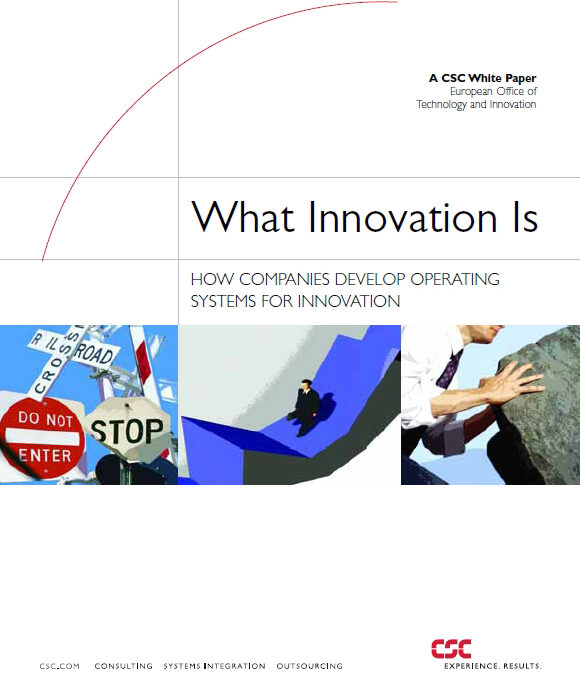
What Innovation Is
Howard Smith, Co-author of the landmark book, “Business Process Management: The Third Wave” has penned a definitive white paper on how companies develop operating systems for innovation. This is one paper anyone interested in business innovation cannot miss.

Teaching Your Partner to do the Business Rules Dance
You can think of the Business Rules Movement as the catalyst that makes a bunch of other techniques and technologies finally gel. On the business side there’s been the movement towards formalized process modeling with the associated entity modeling typical of the IDEF 1.x style approach; and a focus on metrics-based process improvement particularly via TQM and Six Sigma. On the IT side there been the whole Business Process Management framework implementation with the associated Business Process Monitoring pieces to provide streams of real-time metrics.

Case Study: Key Learnings From CAM-I’s Process Based Management Case Study Series
Patrick Dowdle is the Program Director of the ATI/CAM-I Process Based Management (PBM) Program, which is conducting leading edge research in Process Based Management, including the recently published CAM-I book, “Process Based Management: A Foundation Of Business Excellence.” He is also the President and a Process Architect with Process Advantage, which focuses on helping organizations improve customers services.
Pat Dowdle’s main message is about Process Based Management (PBM), which is different from BPM. PBM is about how businesses supply services and products to customers. The problem, according to Dowdle, is that most organizations do not understand or manage their processes, or they do so in isolation so they don’t really manage their products and services. Dowdle maintains that it isn’t enough to have a BPM initiative. If you don’t understand process-based management, your BPM effort will probably fail.
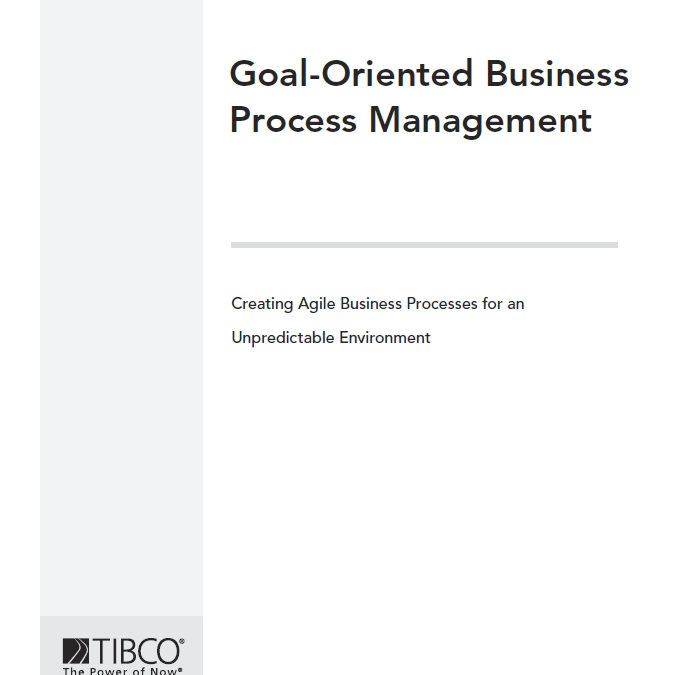
Goal-oriented BPM
Goal-oriented BPM is an approach that makes the development and identification of business processes a more intuitive and natural activity. It uses familiar organizational concepts such as goals, and the steps taken to achieve those goals (sub-goals), provides granular visibility into goal progression, and allows processes to intelligently change course as events unfold. When managed and deployed appropriately, goal-oriented BPM delivers significant benefits, including:
A Whiff of Revolution in the Air
Several of the contributing authors to the exciting new book “The Business Rule Revolution” meet to discuss their view on the state of the revolution. Each provides an overview of their contribution to this anthology of real-world experiences.
Barbara von Halle: Barbara is the primary author of the seminal text “The Business Rules Approach” that serves as the foundation for Business Rule Practices today.

Real World SOA: SOA for Supply-Chain and Logistics
VIP Auto, Inc. has been using Avorcor’s SOA4SCL (SOA for Supply-Chain and Logistics) to modernize their existing warehouse and distribution capabilities and to prepare their organization for integration with a new host system.

Business Process and Business Enterprise Architectural Modeling
If you don’t have the time to listen to this issue’s Featured Archive, this article serves as an executive summary of the presentation, “Business Process and Business Enterprise Architectural Modeling” given by Ken Orr, President and Founder of The Ken Orr Institute. Business Process and Enterprise Architecture are often approached from different directions. This presentation discusses integrating BP and EA initiatives using the Business Enterprise Architectural Modeling approach driven from the business strategy.
Ken Orr is the founder and chief scientist for The Ken Orr Institute, a business technology research organization. He is an internationally known and recognized expert on technology transfer, software engineering, information architecture, and data warehousing.
Will SOA Reduce the Need for Developers?
If you think SOAs will reduce the need for developers, you’re dead wrong.
There is a lot of talk about how SOA will significantly lower the need for developers; thus the savings of SOA. This will be accomplished through the promise of reuse that’s driving many toward the SOA light. However, I’m not sure we’ll see a reduction in development with the advent of SOA, but perhaps a redistribution of talent in the longer term. At the end of the day, the reason for leveraging SOA is agility. Reuse and development savings are a secondary benefit, if they happen at all.

BPM And SOA Are Not A Panacea
Integration Complexity
This business of running a business has become a lot more complicated and much of it can be attributed to the use of information technology. Technology has indeed fueled growth through automation and increased efficiency, but it has also added a management nightmare in the form of disparate systems that are unable to talk to each other. Now we have whole new specialties (like ITIL and COBIT) devoted to managing IT services, assets and infrastructures. How did we end up in this quagmire?

BPMS Watch: Fulfilling the Promise of Process Simulation
A central promise of BPMS is that process improvement can be projected and optimized in advance of implementation, using process modeling’s simulation capability. By including simulation analysis, process modeling tools can not only define the structure of the proposed to-be process but project its expected ROI. For that reason, nearly all BPMS offerings today include some form of simulation tool. But are these tools really fulfilling the promise? Not yet, in my view. Let’s look at what they do, and what’s still missing.
First, let’s deconstruct the promise.

From Specifications to Implementation: the Importance of Workflow Patterns
In the early stages of a BPM project a business might create a written specification and planning level diagram of the project target process. Yet there is much work that must happen to translate these into a functioning business process. The challenge to the process implementer is to see the shape of the business processes based on an oral or written description of the process. An able implementer should perform a lexical analysis of the business requirement to develop a technically accurate assessment. A process solution can break when there is a weak implementation of requirements.

The Time Lens
Time is a critical dimension of customer satisfaction and cost reduction. Getting products and services to customers in a speedy fashion is a value-adding activity. By beating your competitors to market, you gain sales and market share.
As a cost-reduction strategy, time reduction can be very effective. Inspection, moving, setup, rework, and waiting all add costs. The amount of time in these areas can be staggering.
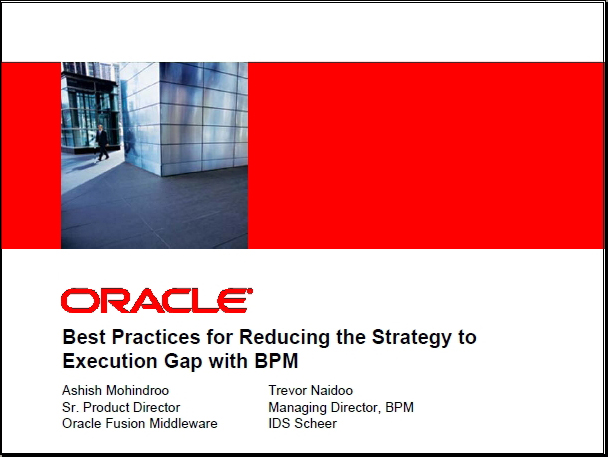
Best Practices for Reducing the Business Strategy to Execution Gap with BPM
According to a recent survey in The Economist, CEOs and CIOs from over 1,000 companies worldwide agree that innovation in business processes is a greater source of competitive advantage than innovation in particular products or services.
Sustainable Business Rules: An Introduction – Part 2 of 3
In part one of this article, I provided an introduction to applying the concept of sustainability to business rules.

Business Architecture: Creation and Application
Business Architecture is not an intuitively obvious concept. It does not conjure up an immediate vision of what it is, or what it comprises. With this inherent disadvantage – the business can’t articulate it easily – how can it be used to align IT with the business?
Business Architecture includes three components: the Functional Architecture, the Process Architecture and the Information Architecture. There are well documented methodologies for developing each component.

The Elusive Missing Link
As one website puts it, history is a puzzle made up of a million different pieces. For business history, the pieces tend to be automation artifacts. You may be translating pieces of history into BPM and BR technology. At times, you operate as a historian, studying...
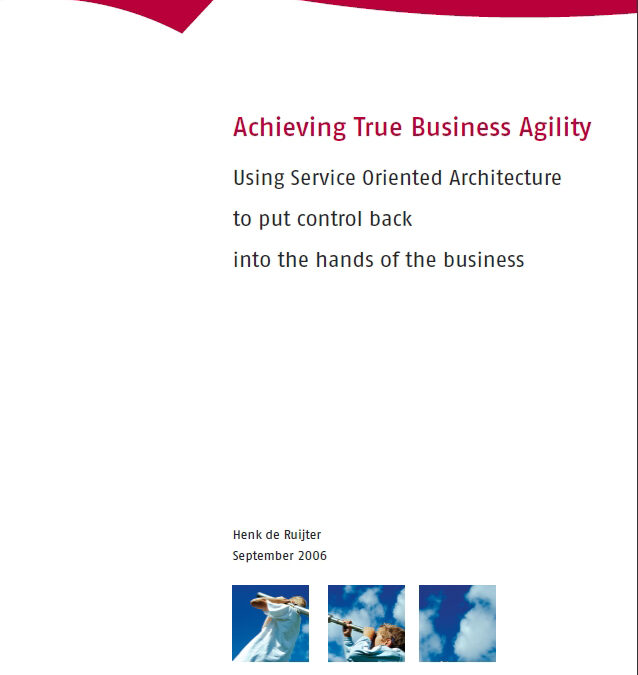
Achieving True Business Agility: Using Service Oriented Architecture to put control back into the hands of the business
The pressure on enterprises to improve operational efficiency and response times to new competitive threats and market opportunities has never been greater.
This pressure is forcing businesses to reevaluate the way they operate, the way IT supports their existing operations and the opportunities for current IT systems to be adapted to support longer term business evolution.
Suggested Treatment, BPM: Geisinger Health System uses BPM to Improve Service, Compliance and Operations
It’s happening in every industry: increasing regulations, demand for better, faster customer service and ever-fiercer competition. The healthcare industry is not immune to these same forces, and often these challenges are exacerbated by greater requirements and expectations of an industry that is nonetheless expected not to profit excessively from its “customers.” But, no one is lessening the strictures of HIPAA, and patients continue to ask why it is that Americans are paying more than any other country for their healthcare and getting less.
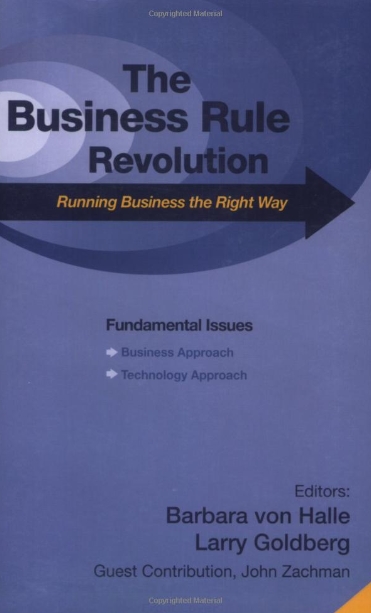
The Business Rule Revolution
The Business Rule Revolution is happening everywhere, even if it seems invisible. In fact, the business rules that are unseen or unknown are precisely the ones that can do the most damage. Invisible rules lurk behind a lack of proper business rule management—creating a precarious business climate for these times.
Consider the growing and painful awareness of questionable accounting practices by some corporate executives in some major organizations. What is at play here? Business rules are at play—good or bad, known or unknown. In these cases, rules were broken or secret. Some were improper rules applied to achieve improper objectives. Think of the Business Rule Revolution as appropriate parties knowing what the rules are, applying the rules in all the right places, and the organization therefore taking full responsibility for its rules and its integrity.













